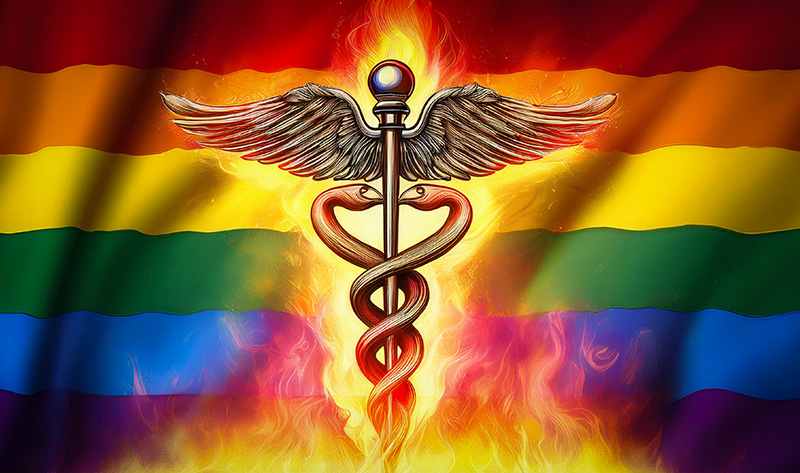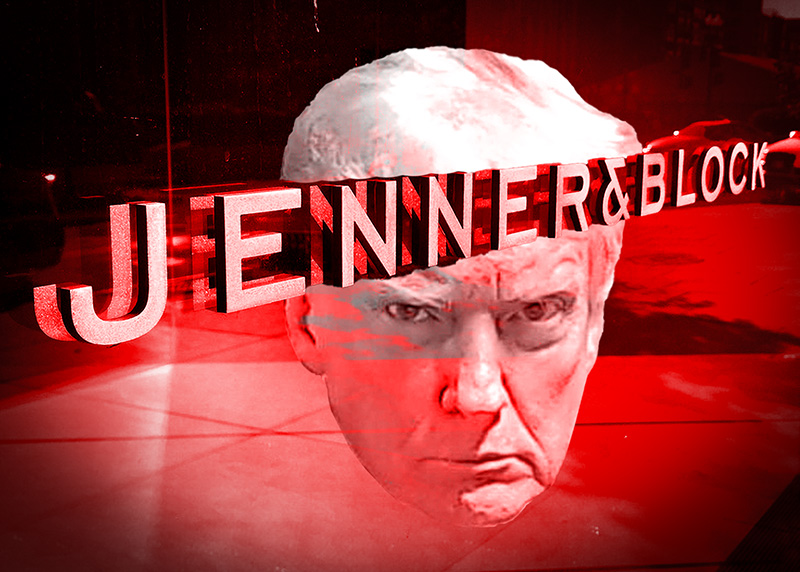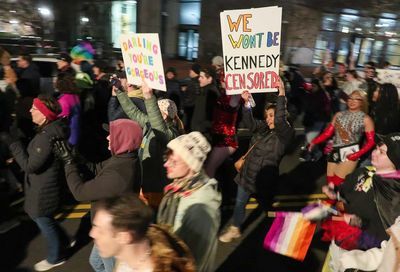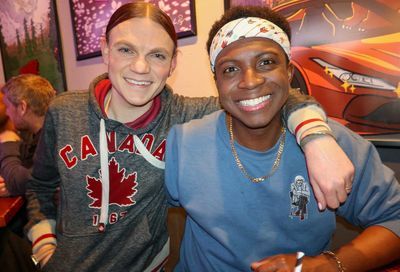The West Winger: Gautam Raghavan on Trump, the midterms, and how Democrats can reclaim America
In his new book, former White House staffer Gautam Raghavan showcases the people behind President Obama's eight years in office

“It’s so funny to watch this White House, and know that Anthony Scaramucci and Omarosa are now household names,” says Gautam Raghavan. “No one knew about the people who held those same kinds of jobs in the Obama White House.”
Compared to their colorful successors, the White House staffers who worked for the previous administration could be considered downright dull. Most were not spotlight-seekers, reality TV show veterans, the progeny of prominent right-wing political families, or fodder for late-night talk shows due to their slavish devotion to fringe ideological movements.
“Most of us never talked to press,” adds Raghavan, who served from 2011 to 2014 as Associate Director of Public Engagement under the Obama White House, and as chief liaison to both the LGBTQ and Asian-American communities. “We were relatively unknown people.”
In his new book, West Wingers: Stories from the Dream Chasers, Change Makers, and Hope Creators Inside the Obama White House (Penguin Random House, $17), Raghavan shines a spotlight on the unseen and often unheralded individuals who helped run the Obama administration, showcasing a number of former staffers, their unique stories, and their reflections from their time in government. That West Wingers also features notable diversity among those featured in the book is a reflection of the emphasis that the Obama White House placed on recruiting people from varied backgrounds.
“Putting this together was fairly easy,” Raghavan says. “I sat down with some friends and former colleagues. We made a big list of about 60 people who we knew had a good story to tell. Then I made my way down that list, trying to get a good mix, because no reader wants to read five stories about healthcare policy or terrorism.”
Raghavan, who compiled and edited the final submissions, deliberately focused on those with personal connections to their stories. “The idea was not to just find people who had a great anecdote, but to find people who were in some way deeply enmeshed in the story that they had to tell,” he says.
For Raghavan and his fellow writers, penning their own stories was “an exercise in nostalgia,” especially for people who are horrified on a daily basis by the antics of the Trump administration. “The bigger issue for a lot of us was putting ourselves in the story. We were used to talking about Obama, the president, his legacy — giving him the credit and telling his story, but not really explaining our own. So it was really hard for us to say, ‘This is how I felt in a moment. Here were my critiques or frustrations.’ You’re not supposed to talk about that kind of stuff, but we wanted to be real about it, too.”
In his own chapter, the 36-year-old Raghavan draws parallels between his own coming out and his eventual marriage to his partner Andy with the evolution of political support for same-sex couples and families, from the time when the Bush administration proposed a constitutional amendment to ban gay marriage to President Obama’s eventual embrace of it as part of his reelection platform.
“In a really weird way, [Andy and I] were lucky that our relationship tracked the evolution of marriage equality, both in terms of public opinion and in terms of the law, where by the time we were ready to get married, we could get married in D.C.,” he says. “It’s sort of a weird parallel trajectory, and, as I write about in the book, plenty of people before us didn’t have that luxury of being there at the right time for the right moment.”
Raghavan now works as a consultant on LGBTQ programming for the Biden Foundation and runs the day-to-day operations of the Indian American Impact Fund, a PAC focused on electing candidates of Indian heritage to political office. But his biggest focus in life is being a father to a 19-month-old girl, who he and Andy adopted last year after two years of being waitlisted.
“All the cliches I found are true about, ‘Oh, it’s the best thing you ever do,'” he says. “In the midst of all this professional and personal chaos, it is so nice and reassuring that our little corner of the world is great, and we can raise this baby girl — and we can teach her differently. I like to joke that she’ll never really remember who Trump was except as a boogeyman.”

METRO WEEKLY: What was your childhood like?
GAUTAM RAGHAVAN: My family immigrated from India to the United States when I was three years old, originally to Atlanta where my Dad was getting his PhD. But then he got a job offer he couldn’t refuse in Seattle, so we moved up there. I grew up in the Seattle suburbs, in a very diverse suburban community. We go back to India every couple of years, but my experience was Seattle suburbs.
MW: What were you like as a child?
RAGHAVAN: I would say I was half-drama nerd and half-band geek. So I was a very popular kid in school. [Laughs.]
MW: When did you come out?
RAGHAVAN: My junior year in college. I started coming out to friends. One of the things that inspired me was I was a resident assistant in a dorm and a bunch of my freshmen kept coming out to me. They were like, “You’re such a great ally,” and I was thinking to myself, “This is ridiculous. You are 18, and you’re freshly out, and I’m still in the closet.” One of the things that also had a huge impact on me was that I spent the summer of 2003 in D.C., and it was the summer of the Federal Marriage Amendment [proposed by] Bush and Rove, using marriage to divide the country. I write about this a little bit in the book.
So I was in D.C. for the summer, and I started dating a guy. I went home for a couple of days before going back to school. My parents and I, we’re very close. We never used to talk about relationships or who I was interested in. But they could tell something was up, especially my mom. I really wanted to say something, and I felt like I also couldn’t. I was at the point where it wasn’t just my identity, it was hiding a relationship with somebody, or at least something that had happened to me over the summer.
I remember one afternoon we were watching Dancer in the Dark, the movie that had Björk in it. I was sitting there, and I really wanted to say something. We got maybe five minutes into the titles when I hit pause, and I remembered telling her, “Hey, there’s something I need to tell you,” and she said, “Okay, what’s going on?” I said, “Well, I started dating somebody over the summer.” She said, “Oh my gosh. Did you get a girl pregnant?” I said, “No, that is not what happened. I started dating a man.” Then we went from there.
Her response was pretty much exactly what you hope a parent’s response will be. If anything, I think she was sad that I hadn’t said something sooner. She felt like, “How long have you been holding this inside, and why couldn’t you tell me?”
MW: You mention in the book that she asked you if you still wanted to have children.
RAGHAVAN: Yeah, “Do you still want to have kids?” Which is the kind of response you want to get from your parent. In that moment, I was still worried about telling my dad. Not for any good reason — I mean, I had gay friends in high school, and they were both super supportive. But I think a lot of young men worry about what their dads are going to say. I told her, “Don’t tell Dad.” I actually went back to school, and we would talk occasionally, and I would say, “I just need some time to figure out how to tell him.”
Eventually, it was, I think, too much for her. And so she told him. I got back to my dorm room, and there was a voicemail from my Dad where he basically said, “Mom told me. Don’t worry. We love you.” Then he said, “I wonder how many people in our family were gay and couldn’t say anything about it,” which was a profoundly insightful thing to say in that kind of a moment.

MW: When you were working at the Pentagon, you got a call from Brian Bond asking you to replace him as LGBTQ liaison for the White House. What was that like?
RAGHAVAN: Working on “Don’t Ask, Don’t Tell” was my first, real in-depth experience working with the community and with the movement organizations. It was, obviously, a super intense experience because it was a presidential priority, and it initially meant a lot to the community. I mean, I couldn’t have asked for a better way to get to know Joe Solmonese at HRC or Aubrey Sarvis at what was then Servicemembers Legal Defense Network. It was the best way to get to know all these players and organizations. When it was over, I was sad to see that end because we were still working on the early part of implementation. But I really enjoyed that experience. I loved that the work was so personal to me.
So when Brian called I was like, “Absolutely, I want that job,” even though it was a pay cut, and the hours were going to be worse, and there was a lot of pressure. I was ready for the challenge.
MW: In your role, were you ever asked to work on or consult on other issues?
RAGHAVAN: Yeah, for a couple of reasons. One is I was also the Asian-American liaison. Many of my days, I was switching between communities and modes and people I was talking to. So, that automatically forced me to think about things a little bit differently because I was thinking about immigration both in terms of the experience of binational, same-sex couples, but also in terms of undocumented kids. That’s one piece of it. But the other was really that in the Office of Public Engagement, we had morning meetings, and we all shared offices. So it was impossible not to pick up on what was happening in other communities. I think, rightfully so, there was a real focus on making sure that all of our communities were not just thinking about their number one, two, or three agenda items but also about the other things that were happening in the country.
To the credit of a lot of these groups, I will say that, historically, a lot of our movement organizations have been very siloed in terms of what they think about as a queer issue. But increasingly, I think they’ve been more receptive and more aware of the linkages between various issues. I think the landscape we’re in right now has really forced a lot of these organizations to understand, “We have to stand up around Black Lives Matter and the Muslim ban and DACA,” which is nice to see. So for all those reasons, I think we really did try to look at things holistically.
MW: Was there ever a point while working in the White House where you started questioning the administration? Where you thought, “They really don’t have a handle on this,” or “What did I get myself into?”
RAGHAVAN: All the time. I mean, it’s hard not to question what’s happening, either because the media covers it or because for those of us who were liaisons to communities, when things weren’t going well, we heard about it. That’s sometimes a hard position to be in.
But then, the great days are really great. An example of this was we tried for three years to get an executive order on federal contracting, and there was reticence and hesitation for a lot of reasons along the way. Some good reasons, some bad reasons. But that was really hard because I knew fully that it would cover about 22 percent of the workforce in America. And to be told we can’t get it done because the timing isn’t right, the optics might be tricky for us, or the backlash will be problematic, was really hard to hear.
MW: What was the main reason for the delay?
RAGHAVAN: I think it was a couple things. One was that there are always competing priorities in any given time. There’s only so much political capital that can be used for any given community. The second reason was there was a desire to see how far can we get legislatively before turning to executive action. The third reason had a lot to do with this notion that the economy was just beginning to recover, and that an executive order that tells federal contractors that a certain kind of discrimination is prohibited would be poorly received in the business community, and people would use that to say, “Oh, it’s more liberal regulations that will harm business.” We know that was not the case, and it doesn’t actually bear out. A lot of these companies already protect their employees, but that was a concern that I remember hearing.
MW: Someone told me that they believe Democrats need to realize the only time they’re going to get anything on LGBTQ rights passed is if they control all three branches of government, and just ram it through and accept the electoral consequences. Do you agree with that sentiment?
RAGHAVAN: To some degree. But I remember in 2010, I sat in the Senate gallery the day that “Don’t Ask, Don’t Tell” repeal passed and the DREAM Act failed. We had the Senate, we had the House, we had the White House. But it took a lot of political capital to get the Affordable Care Act passed. Then you had the jobs package and all the [economic] stuff that happened earlier on. If things had gone differently, and we hadn’t had an economic crisis at the beginning, I think we could have made a lot more progress in those two years.
MW: When Republicans are in charge, they don’t seem afraid to push through the legislation, judges, and Supreme Court nominations they want approved, regardless of how popular it is. Do Democrats need to be more cutthroat in pursuing their agenda?
RAGHAVAN: I think it’s two different things. One argument is about values, and one is about process. What I think is a completely legitimate critique is that too often progressives and Democrats don’t stand up for their values and say, “This is what we’re for” and articulate it. Sometimes, we’re too quick to compromise on whatever issue it might be. But on process, I push back a little bit because I don’t think that ramming through bills or nominations is ultimately healthy for the system. The next guy or gal can chip away or undo parts of it, too.
“Don’t Ask, Don’t Tell” is a great example. You could have said, “Why do a year-long study on repeal at the Pentagon? Just do it. Just have a vote and get it done.” One reason is I don’t think that the vote would have gone the way we wanted it to, certainly not with the extra Republican votes it ended up getting. But two, when you take the time to do things the right way, it makes it a lot harder to undo. So I don’t buy the argument that, for example, if Democrats take control of the Senate and the House, that we should just go nuts. But I do think we should articulate what we’re for and have votes to push for change.
MW: In your book, you mention, as LGBTQ liaision, putting references to loving, committed couples in speeches and sort of moving the president to where you hoped he’d eventually end up.
RAGHAVAN: I didn’t think about it as moving the president. And quite frankly, I don’t think anyone could move the president. I didn’t see that as my role. I saw it more as “Let’s just make sure he’s seeing every part of our community,” including couples who want to get married and have kids and need to protect them. Let’s make sure he sees that, and let’s give him as much information and anecdotes and opportunity to see us and grapple with whatever he’s grappling with on his own.
But it was hard. Those were really hard months to go through all that, especially as a married staffer, and to increasingly get questions from the community of, “What is taking so long? What’s the problem?” That was really hard. These were the days where I did think about whether this was right gig for me, or maybe I couldn’t handle this, or if someone more creative or aggressive were in my position, maybe they’d push harder and get it done.
MW: What do you think can be done if Democrats take back the House? Are they essentially there as a fail-safe?
RAGHAVAN: They can exercise their oversight authority. There are people right now like, “What’s oversight?” There needs to be a co-equal branch that is actually doing its job. That’s what I hope will happen.

MW: What should Democrats be talking about in the final month before November’s election?
RAGHAVAN: I think we should we talk about values. Especially in these last few days, there is a stark contrast in terms of values between what progressives and Democrats offer, and what is the current state of play with this administration and the Republican majorities.
Even what’s happening right now with Kavanaugh. It’s what’s happening with him, but more importantly, it’s how they’re treating Dr. Ford and the ways in which they’re talking about her and other women who’ve experienced sexual assault in their lives. Number one, it’s disgusting. But number two, I think there are a lot of people who see that and are rightfully turned off by it.
I also think the corruption and nepotism we’re seeing across the entire administration is something we should talk about. We are a party that is for transparency and ethics and democratic norms. Especially in individual districts, it’s about values.
MW: But Republicans will say that when Democrats get in power, they’re equally as bad. They promise transparency and ethics, and then violate those standards.
RAGHAVAN: Yeah, but I mean, let’s contrast the scandals. As I like to joke, the biggest scandal in Obama’s years was the tan suit. When we confirmed Sonia Sotomayor, the big scandal was the “wise Latina” speech, which is also in the book.
Compare that to what we’re seeing now in this Supreme Court nomination. No party is ever going to be completely transparent or blameless when they have power. But I think the contrast is pretty clear. It’s funny, I don’t think we use the word “Trump” anywhere in this book, and we don’t have to, because I think the contrast between what the Obama White House looked like and what this White House looks like is very clear, both in terms of the kinds of people who are there and what motivates them.
MW: Talking about the White House, was there dysfunction that we just didn’t know about? Did you ever have self-interested staffers back-talking the president or lying to him…
RAGHAVAN: …or taking papers off his desk or hiding pens?
MW: Right. Some people are going to argue that “This happens in every White House.” Is that true?
RAGHAVAN: No, it’s not true, and quite frankly, I don’t think it happened in the Bush White House before us either. This is a completely different ballgame. I think it’s a lot of people who are there for the wrong reasons who are taking their cues from the commander-in-chief. You also look at the way in which these people are thinking about government and public service, and that’s really demoralizing.
I think whoever comes in next is going to have a lot of work to do to adjust course and remind the American people, “Here’s what it means to be president and to serve and to lead.” What we’re seeing now is totally batshit crazy.
MW: A lot of people like Trump because he says exactly what he’s thinking, and doesn’t kowtow to political correctness. What’s the main problem with the way the president acts or the way the White House conducts business?
RAGHAVAN: We’ll see how well it continues to play out. I remember seeing an election night exit poll that said public trust in government was in the low double digits. It was something like 11 percent or 17 percent. I remember thinking, “That is insane that people have such little trust in government.” That is a part of the reason why Trump won — if you don’t trust government, then what does it matter who’s leading it?
But to answer your question, there needs to be some morality and integrity in the office of the president. It’s not just about setting an example domestically, but it’s also how we’re seen around the world. I think that, at its core, the lack of stability is a huge problem with what we’re seeing right now.
MW: If public trust in government is at an all-time low — and may get worse — how can the Democrats be successful?
RAGHAVAN: Well, people can start by reading our book. I say that jokingly. One of the things that we try to capture in the book is the ways in which policy change directly impacted people’s lives, which is why it’s such a diverse group of authors, because all of our lives were in some ways shaped by the things that we did in the Obama administration. Quite frankly, I don’t think we did a good enough job in the administration of telling the stories, and explaining to people why the things that we were doing mattered to them.
I mean, we’ve lost this argument for decades. We don’t explain why things like Medicaid or our national parks or the roads we drive on are connected to government writ large. We’ve ceded the argument that “big government” is bad, that there’s a lazy federal workforce, that there’s this rigid bureaucracy. Some of those things are true in certain places, but on the whole, it’s not true.
MW: Why do you think it’s not true?
RAGHAVAN: From my experience, for every quote-unquote “lazy federal worker” there are at least a dozen people who really care about their work, and they stay there not for the benefits, but because they are really good at what they do, and they feel like what they do has a real impact on people. There is no other industry — philanthropy, the private sector, faith communities — that can have the kind of reach and impact the government can. It’s not possible.
For government, you have to have people who really believe in it and who represent the people, and believe they can do good and are not there to criticize the deep state or freeze federal worker pay or make it easier to fire people. But it also requires government being run and staffed by the right people. Why would you want to hire someone who doesn’t believe in philanthropy to run a foundation, or someone who doesn’t believe in God to run a church? It doesn’t make sense.
MW: Do you think that the current administration could get the same diversity of voices and opinions to write a similar book, or are the type of experiences you chronicle unique to the Obama White House?
RAGHAVAN: That’s a hard question to answer. In terms of the diversity of the authors we have, no. Just look at the White House staff, their internship classes, the administration, the judges, the appointees. There’s a complete lack of diversity. It’s overwhelmingly white men.
I don’t know anyone who works in this White House. But I will say I have some degree of empathy for some of the folks who work there, who probably came out of campaigns or the Hill or the RNC who were probably thinking to themselves, “This is my one shot to work at the White House and do good on the issue that I care about.” I think that’s fine. I think you should go do that. You should follow your dream and work on your passion.
But the question then becomes: how long can you stay? How long do you let that play out? At some point, everyone’s got to have their own line of “This is no longer a place where I can work and a cause I can support.” I’m sure there are good people with good intentions on the inside right now. But I don’t think you’d get a book like this.
MW: Is there anything that you regret not having done during your time in the White House?
RAGHAVAN: Two things. One is a policy thing, where I wish we moved faster on the trans military service policy change, and on the Title IX regulations, because those are both things that were done through executive regulatory authority, not through Congress, and they both happened in the last year. I wish we had done those earlier, because I think they would have had more time to be fully baked in and harder to undo.
I think my personal regret is I actually wish I’d stayed until the end because at the time, my husband and I were like, “We need to start a family. We can’t do it with these hours and this pay. So I need to go make some money and have some flexibility.” I don’t regret that, obviously, but I always assumed that there’d be an opportunity to come back perhaps in the next administration. When that didn’t happen, you realize how much it mattered when you were doing that work.
MW: Would you ever go back to work for a future Democratic administration, even if it meant taking a pay cut?
RAGHAVAN: If I believe in the values, yes. If Hillary had won, I would’ve been in the Clinton administration today, I’m sure. At least I would have liked to. Like I said earlier, I really believe that there’s no other sector or institution that can have the impact that government has. So in terms of having the greatest reach and positive leadership, that’s where I’d want to be.
West Wingers: Stories from the Dream Chasers, Change Makers, and Hope Creators Inside the Obama White House is published by Penguin Random House, and is available in paperback or ebook. To purchase a copy, visit amazon.com or penguinrandomhouse.com.
Support Metro Weekly’s Journalism
These are challenging times for news organizations. And yet it’s crucial we stay active and provide vital resources and information to both our local readers and the world. So won’t you please take a moment and consider supporting Metro Weekly with a membership? For as little as $5 a month, you can help ensure Metro Weekly magazine and MetroWeekly.com remain free, viable resources as we provide the best, most diverse, culturally-resonant LGBTQ coverage in both the D.C. region and around the world. Memberships come with exclusive perks and discounts, your own personal digital delivery of each week’s magazine (and an archive), access to our Member's Lounge when it launches this fall, and exclusive members-only items like Metro Weekly Membership Mugs and Tote Bags! Check out all our membership levels here and please join us today!


























You must be logged in to post a comment.